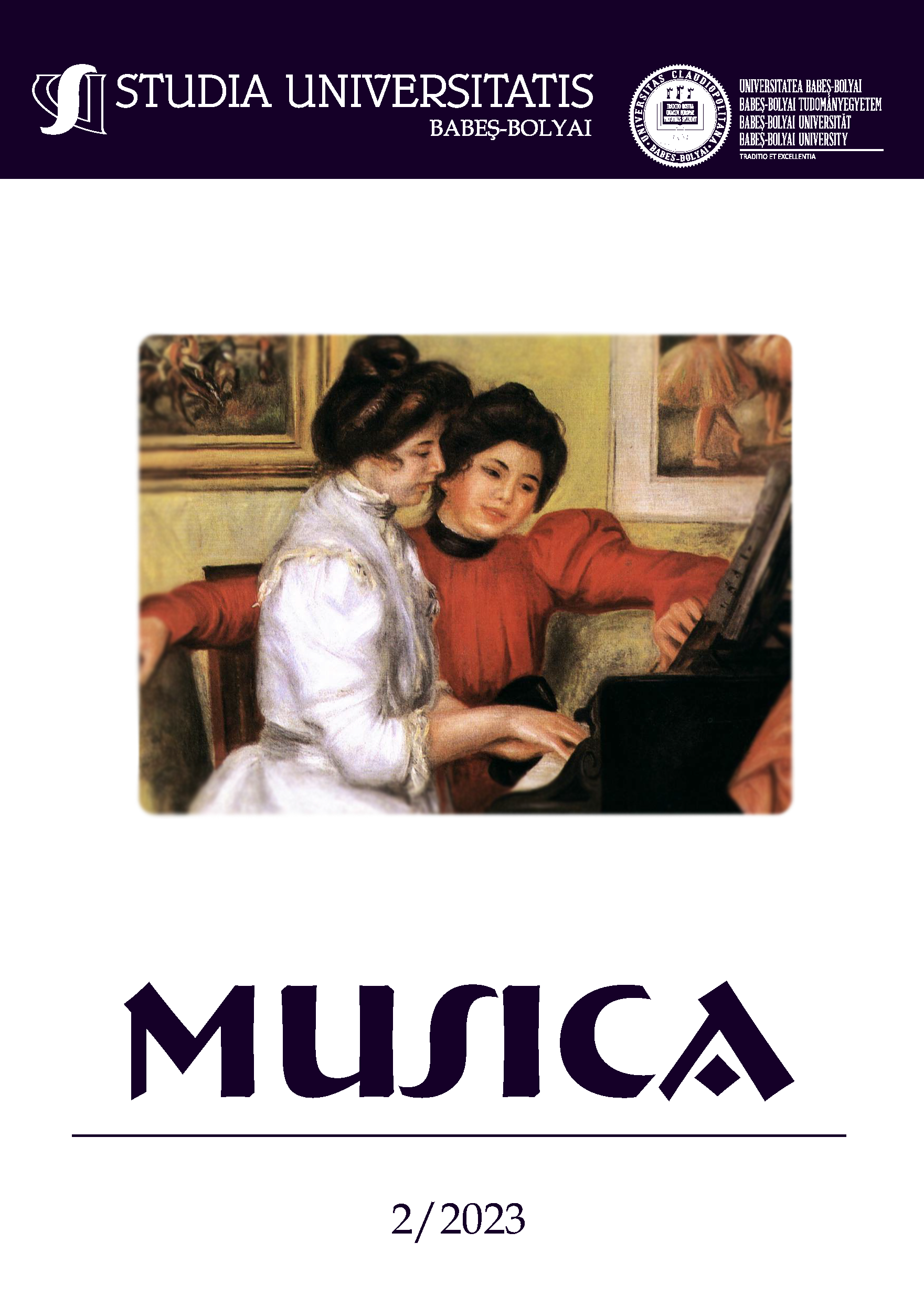Interpretative Elements of György Kósa’s Chinese Song Series From an Art Psychology Perspective
DOI:
https://doi.org/10.24193/subbmusica.2023.2.20Keywords:
Chinese songs, György Kósa, Po Chü-i’s poetry, Sándor Weöres, performing arts, creative arts, singing voice, Stella FerchAbstract
I got to know the art of György Kósa (1897-1984) during my performing career. During the performances of the first Chinese Songs series, the songs inspired me to learn more about the composer. Delving into the literature shed light on the composer’s artistic concept, elements of which I can identify with also as a performer. It can be said that, even if we focus only on his songwriting, his most important role as a songwriter is to communicate values. His choice of lyrics is based on a profound knowledge of twentieth-century Hungarian and world literature, and his literary themes represent both the cultural and mental-spiritual well-being of the time, and satisfy the musician’s need for expression, both on a personal and a communal level. György Kósa’s oeuvre as a songwriter is a densely woven structure, consistently and organically formed. The songs are each a microcosm of their own, linked to a particular state of being, time and emotional mood of the individual, and in portraying this, the literary and musical tools employed can all be accurately mapped.References
Bánky, József. Rendhagyó zongora szakmódszertan (Unconventional piano methodology), University of Pécs, Faculty of Arts, Institute of Music, 2019.
Berlász, Melinda (ed.). Kósa György, Akkord Publishing House, Budapest, 2003.
Bieliczkyné Buzás, Éva. Találkozásom Kósa Györggyel (1980. május 07.) (My Encounter with György Kósa (07 May 1980).
Bieliczkyné Buzás, Éva: Emlékezzünk Kósa György zeneszerzőre (Remembering Composer György Kósa) 15 June 2020, https://xn--hajdtnc-lwa7t.hu/emlekezzunk-kosa-gyorgy-zeneszerzore/ Last accessed in 2022. 07. 01.
Breuer, János. Ahol a zeneelmélet csődöt mond (Where Music Theory Fails), in Parlando, No 4., 10-11, 1960.
Csibra, Zsuzsanna. Klasszikus kínai költészet (Classical Chinese Poetry), Pázmány Péter Katolikus Egyetem (Pázmány Péter Catholic University) Bölcsészet- és Társadalomtudományi Kar, Akadémiai Kiadó, 2018. https://mersz.hu/dokumentum/m382kkk__4/ Last accessed on 2022. 07. 01.
Csörgő, Zoltán. A buddhista szimbólumok világa (The World of Buddhist Symbols). Ed. A Tan Kapuja Buddhista Egyház, 2018.
Dobák, Pál. A romantikus zene története (The History of Romanticist Music). Nemzeti Tankönyvkiadó, Budapest, 1999.
Fitzgerald, Patrick. Az ősi Kína, Múlt születése (Ancient China, The Birth of the Past), Helikon, Budapest, 1989.
Földes, Imre. Hangrendszerek és hangsorok a 20. század zenéjében (Tonal Systems and Scales in 20th Century Music) http://www.foldesimre.hu/oldal.asp?id=33 Last accessed on: 2022. 07. 01.
Frank, Oszkár. Hangzó zeneelmélet II. (Vocal Music Theory II.), Főnix Zeneműhely, Budapest, 2015.
Hamar, Imre. A kínai buddhizmus története (The History of Chinese Budhism), ELTE East-Asian Studies Department, Balassi Publishing House, 2004.
Horváth, Zsolt. Különféle tonális rendszerek és jelenségek a 19. és 20. században (Different Tonal Systems and Phenomena in the 19th and 20th Centuries) https://music.unideb.hu/hu/kulonfele-tonalis-rendszerek-es-jelensegek-19-es-20- szazadban. Last accessed on: 2022. 07. 01.
Kwei Chen (1953): “Po Chu-i: People’s Poet,” in China Reconstructs, Vol. 4, July/August, 31 - 5. https://www.enotes.com/topics/po-chu/critical-essays/criticism, Last accessed on: 2022. 07. 01.
Po Csü-i: https://terebess.hu/keletkultinfo/pocsuji.html Last accessed on: 2022. 07. 01.
Romsics, Ignác. Magyarország története a XX.században (The History of 20th Century Hungary), Osiris Publishing House, Budapest, 2001.
Schönberg, Arnold. A zeneszerzés alapjai (Fundamentals of Musical Composition), EMB, Budapest, 2014.
Stachó, László. “A zenei képesség és az előadóművészi kiválóság” (Musical ability and excellence as a performer), in Parlando, https://www.parlando.hu/2014/2014-1/2014-1-02-Stacho2.htm#_edn2 Last accessed on: 2022. 07. 01.
Strobel Heinrich. Paul Hindemith. B. Schott’s Söhne, Mainz, 1948.
Szekeres, József (ed.). Az ismeretlen Sztanyiszlavszkij (The Unknown Stanislavsky), Színháztudományi Intézet Budapest, 1960.
The poems of Po Csü-i, translated by: Sándor Weöres, Rough Translation and notes by Barnabás Csongor. Szépirodalmi Kiadó, Budapest, 1952.
Tőkei, Ferenc – Miklós, Pál. A kínai irodalom rövid története (The Short History of Chinese Literarure), Gondolat Kiadó, Budapest, 1960.
Turcsányi, Emil. “Mit jelent a bitonalitás?” (What Does Bitonality Mean?), in Parlando, 1964/2.
Zsoldos, Péter. „Kósa György”, in: Muzsika (Music), (XV., 4.), 1972.
Downloads
Published
How to Cite
Issue
Section
License
Copyright (c) 2023 Studia Universitatis Babeș-Bolyai Musica

This work is licensed under a Creative Commons Attribution-NonCommercial-NoDerivatives 4.0 International License.






